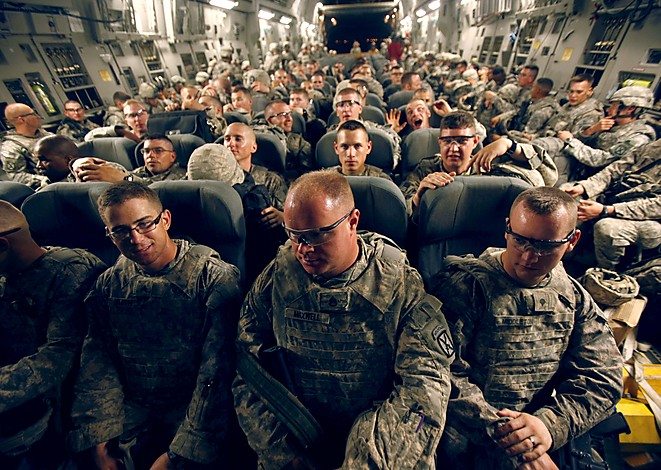
OUR SOLDIERS COME HOME
Then Presidential-candidate Barack Obama vowed if elected, he’d end the war in Iraq and bring our troops home. Now President Obama has kept that promise.
Late last week, U.S. combat troops began secretly leaving Iraq, finally leaving behind multiple tours of duty and heading home toward their families and loved ones. The symbolism of the moment, which has been 7 years and 5 months in the making since the US-led invasion toppled Saddam Hussein, wasn’t lost on the departing soldiers. Cheering loudly and reveling in the moment as they crossed over the border into Kuwait, the soldiers honked their horns and shouted: “We’re going home, woo hoo!”
The brigade’s leaders were on hand and greeted the exhausted troops as they pulled into a car park and shed their sweaty armour. Said Colonel John Norris: “This is powerful. This is exciting for me. As a commander, this means all my soldiers are safely inside Kuwait and getting ready to redeploy back to their families.” And back home to their families they have gone.







Quote of the DayRetired Army Col. Andrew Berdy vents over at Tom Ricks' place:Can you explain to me how, or why, the myth of "all combat troops out of Iraq" is allowed to be perpetuated by the press, much less our senior military leadership? Yes, the mission has changed. But units like my son's Stryker Brigade (not the one that just left!) are, and always will be, combat infantry units. This is fiction pure and simple. I just don't get how the nation has swallowed this and why members of the media are not reporting facts the way they are rather than the political PR message the Administration wants portrayed. Does anyone not think that the likelihood of continued combat operations is a reality? When casualties are taken by these "non-combat forces" will those casualties be characterized as "non-combat" as well? […]H/T: The Daily DishAnd on a related note: “Invisible Wounds: Mental Health and the Military”by Mar Thompson of TIME Magazine, Sunday. Aug. 22, 2010 Excerpts:“U.S. Army specialist Ethan McCord was one of the first on the scene when a group of suspected insurgents was blown up on a Baghdad street in 2007, hit by 30-mm bursts from an Apache helicopter. "The top of one guy's head was completely off," he recalls. "Another guy was ripped open from groin to neck. A third had lost a leg … Their insides were out and exposed. I'd never seen anything like this before. ………………Ethan McCord's mind and thousands like his are the U.S. Army's third front. While its combat troops fight two wars, its mental-health professionals are waging a battle to save soldiers' sanity when they come back, one that will cost billions long after combat ends in Baghdad and Kabul. It is a high-intensity conflict: Army troops, TIME has learned, are seeking mental help more than 100,000 times a month. That figure reflects a growth of more than 75% from the final months of 2006 to the final months of '09, according to Army data. Army Lieut. Gen. Eric Schoomaker, the surgeon general who oversees the mental and physical well-being of the nation's soldiers, concedes he doesn't have the doctors and therapists he needs. "We're in uncharted territory in respect to the strain on the force," Schoomaker said recently. Translation: he needs help. According to the Army's estimates of its needs, 414 psychiatrists are 20% fewer than Schoomaker should have. A study released by the Army on July 29 concluded that "numerous critical shortages of care providers including behavioral health" personnel are hurting its efforts to curb suicides. "The Army has been criminally negligent," says Captain Peter Linnerooth, an Army psychologist for nearly five years until 2008, who notes that the service has had a difficult time finding psychiatrists to care for combat vets, which puts even more pressure–"and way too much burnout"–on those who stay. […] Read: http://www.time.com/time/magazine/article/0,9171,…